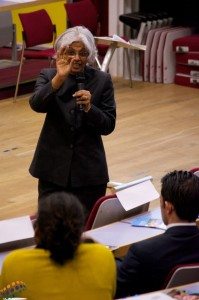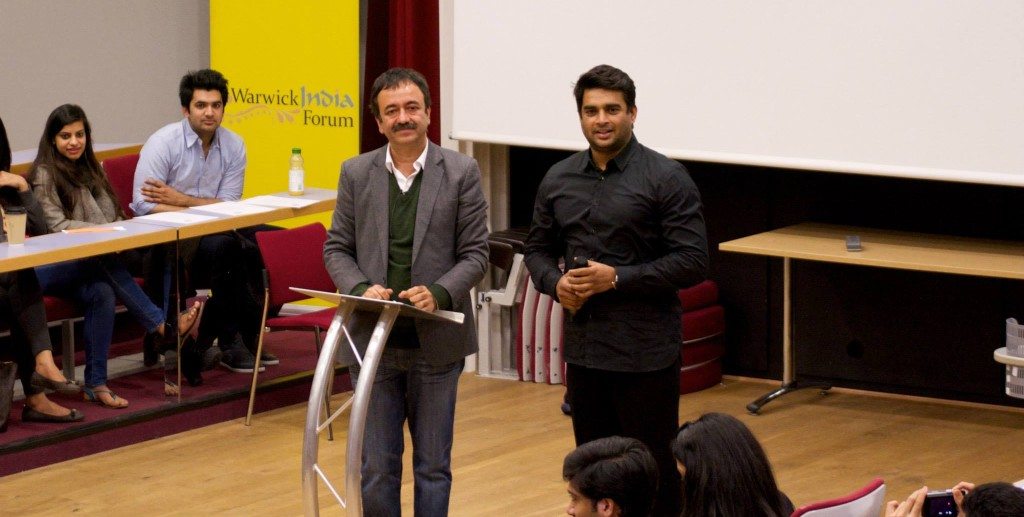Warwick India Forum 2015
India Reconstructed, a conference organised by the Warwick India Forum, took place on February 21 at the Woods Scawen Room in the Art Centre.
In the words of Dr. Shailaja Fennell, a lecturer in development studies at the University of Cambridge and a guest speaker at the conference: “to reconstruct something we must first deconstruct it”, in particular, “deconstruct the challenges facing India” in the areas of education and skills, employment, and beyond.
Dr. Fennel examined the challenges India faces in terms of the inability of its educational institutions to provide its youth with the necessary skills for employment.
Her talk gave an insight of the gendered problem in all areas of Indian society be it education or employment. Her main focus, however, was on “learning gaps”- the difference in skill level between private schools and government schools, and “employment gaps”- the difference in level of labour force and jobs available. She talked about these issues in the context of Alwar, Rajasthan and the rise of “Kota Schools” ’or tuition centers that have come to replace mainstream schools.
 This is a huge area of concern for the government, and although Dr. Fennel agreed that there was no easy solution, she said that the government should strive for more regulation in private, public, and ‘kota’ schools to ensure that students are getting quality education.
This is a huge area of concern for the government, and although Dr. Fennel agreed that there was no easy solution, she said that the government should strive for more regulation in private, public, and ‘kota’ schools to ensure that students are getting quality education.
Apart from academics like Dr. Fennell, the conference attracted speakers from a diverse range of backgrounds, from politicians like Kiran Bedi and Shashi Tharoor to top names from the Bollywood industry like director Rajkumar Hirani and actor R. Madhavan, who elaborated on different points Dr. Fennell brought up.
The issue about gender was further discussed by Kiran Bedi – a politician, social activist, and former female Indian police officer. She spoke eloquently about the necessary qualities needed in a good leader and expressed concerns that women are falling out due to a “lack of endurance in the outdoors” which stem predominately because of the patriarchal society in India.
She talked about her own experiences as well. Coming from a relatively conservative family who wanted to marry her off at an early age with a large sum of dowry, she had to rebel in order to delay marriage and pursue a career. Although she stresses that there is nothing wrong in women choosing to get married, she strongly opposes forcing a certain way of life upon women.
She has set up charities to help tackle this social issue in India under her motto of “giving works”. They include ‘India Vision Foundations’ and ‘Navjyoti India Foundations’. Furthermore, she expressed the need for the youth to start a “bottom-up revolutionary process” as, in her words, it is the only way to change the social order in India.
Shashi Tharoor, another Indian politician and former Under-Secretary General of the UN, looked at the Indian economy from a bigger picture. He focused on the use of “soft power” for India to achieve its goals: from Bollywood to Indian cuisine, spreading the culture around the world can make foreigners enthusiastic to embrace “Incredible India”.
India, according to Tharoor, is not a melting pot like the United States but a “Thali” or a platter. All the different cultures come together, not necessarily mixing, but united. He said: “To be an Indian means you can be many things. You can be Muslim, Keralite, and Indian at the same time.”
He said it was more important for India to aim to not be “super poor” rather than aim to be a “super power” referring to the fact that income inequality still is a major issue in India.
Coming from the soft power perspective, the Bollywood industry was also part of the discussion as it plays a huge part in India’s cultural presence abroad. Films like 3 idiots, and the Munna Bhai series touched the hearts of millions of people worldwide. Joining the conference was the mastermind director Rajkumar Hirani and actor R. Madhavan.
 Hirani acknowledged that at this point, Hollywood is still far ahead of Bollywood in terms of technology. He said: “I genuinely admire Avatar and wonder how it was made.”. He added, however, that Indian cinema is evolving too.
Hirani acknowledged that at this point, Hollywood is still far ahead of Bollywood in terms of technology. He said: “I genuinely admire Avatar and wonder how it was made.”. He added, however, that Indian cinema is evolving too.
The power of editing was the focus of his talk as he tried to convey the point across that editing can make or break a film. He advised budding filmmakers that to make a good movie one should pick triggers from real life and avoid filler scenes making sure each scene either makes the audience “laugh, cry” or have some sort of “drama” to it.
By the end of the conference, the attendants were left with the national anthem feeling a little patriotic and optimistic about the future of India. But challenges remain, and it is the youth that has the potential to reconstruct India for the better.

Comments